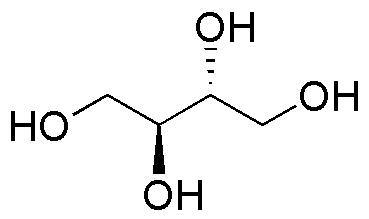meso-Erythritol is widely utilized in research focused on:
- Food Industry: As a low-calorie sweetener, it provides a sugar-like taste without the calories, making it ideal for sugar-free products.
- Pharmaceuticals: Used as a stabilizing agent in drug formulations, enhancing the shelf-life and effectiveness of medications.
- Cosmetics: Acts as a humectant in skincare products, helping to retain moisture and improve skin texture.
- Biotechnology: Serves as a cryoprotectant in cell preservation, aiding in the storage of biological samples at low temperatures.
- Research Applications: Utilized in studies related to metabolism and sugar alcohols, providing insights into dietary impacts on health.
General Information
Properties
Safety and Regulations
Applications
meso-Erythritol is widely utilized in research focused on:
- Food Industry: As a low-calorie sweetener, it provides a sugar-like taste without the calories, making it ideal for sugar-free products.
- Pharmaceuticals: Used as a stabilizing agent in drug formulations, enhancing the shelf-life and effectiveness of medications.
- Cosmetics: Acts as a humectant in skincare products, helping to retain moisture and improve skin texture.
- Biotechnology: Serves as a cryoprotectant in cell preservation, aiding in the storage of biological samples at low temperatures.
- Research Applications: Utilized in studies related to metabolism and sugar alcohols, providing insights into dietary impacts on health.
Documents
Safety Data Sheets (SDS)
The SDS provides comprehensive safety information on handling, storage, and disposal of the product.
Product Specification (PS)
The PS provides a comprehensive breakdown of the product’s properties, including chemical composition, physical state, purity, and storage requirements. It also details acceptable quality ranges and the product's intended applications.
Certificates of Analysis (COA)
Search for Certificates of Analysis (COA) by entering the products Lot Number. Lot and Batch Numbers can be found on a product’s label following the words ‘Lot’ or ‘Batch’.
*Catalog Number
*Lot Number
Certificates Of Origin (COO)
This COO confirms the country where the product was manufactured, and also details the materials and components used in it and whether it is derived from natural, synthetic, or other specific sources. This certificate may be required for customs, trade, and regulatory compliance.
*Catalog Number
*Lot Number
Safety Data Sheets (SDS)
The SDS provides comprehensive safety information on handling, storage, and disposal of the product.
DownloadProduct Specification (PS)
The PS provides a comprehensive breakdown of the product’s properties, including chemical composition, physical state, purity, and storage requirements. It also details acceptable quality ranges and the product's intended applications.
DownloadCertificates of Analysis (COA)
Search for Certificates of Analysis (COA) by entering the products Lot Number. Lot and Batch Numbers can be found on a product’s label following the words ‘Lot’ or ‘Batch’.
*Catalog Number
*Lot Number
Certificates Of Origin (COO)
This COO confirms the country where the product was manufactured, and also details the materials and components used in it and whether it is derived from natural, synthetic, or other specific sources. This certificate may be required for customs, trade, and regulatory compliance.


